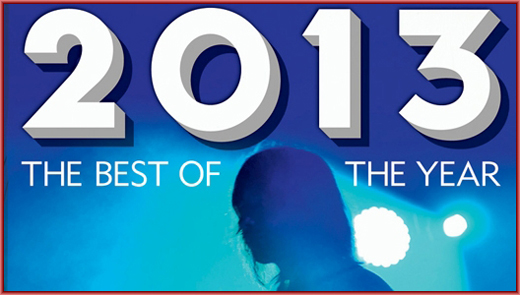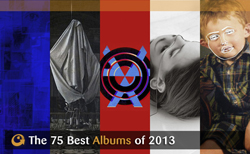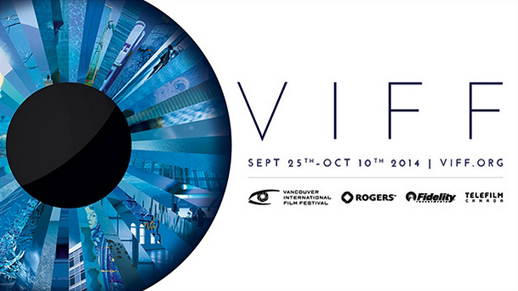
For VanRamblings, for 30+ years now, the première cultural event of our calendar year sustains as the annual Vancouver International Film Festival.
Earlier today, we ran into Curtis Woloschuk — VIFF programmer, publications editor, and programme logistics co-ordinator (each title of which deserves capital letters) — at the Starbucks at Davie and Seymour, nearby the VIFF offices. Curtis, along with all the other adventurous, dedicated staff of VIFF, is working hard at it, preparing for VIFF 2014, as has been the case for many months now. Curtis was saying that today, VIFF will post its first VIFF 2014 programming announcement, the 2014 Cannes highlights and award winners that will arrive at our VIFF in 2014 — which, of course, can only cause VanRamblings to whoop with joy!
Imagine, Leviathan is on its way! And Bennett Miller’s Best Director winner at Cannes, Foxcatcher, which is certain to emerge as not only one of the prestige pictures of the year, and a certain Best Picture Oscar contender, but as well, as an all-but-certain Best Actor Oscar nominee in Steve Carell.
Alice Rohrwacher’s Grand Prix winner, The Wonders — the Cannes winner to which we were most looking forward, and the picture we prayed to the Gods (and to Alan Franey) to please, please bring to 2014’s Vancouver International Film Festival — will arrive at VIFF 2014. Yippee! VanRamblings absolutely loved Rohrwacher’s début film, 2011’s exquisite, resonant, melancholy, tremendously lovely, authentic, quiet and beautifully observant Corpo Celeste. The Wonders in Vancouver — we are in heaven!
Read all about the remaining 2014 Cannes highlights, and winners, that will arrive in Vancouver in late September and early October — and you will, as does VanRamblings, find yourself more than a little bit over the moon.
![]()
![]()
![]()
Mid-afternoon, VanRamblings was pleased and surprised to find an e-mail in our iPhone inbox announcing the revamping of the VIFF focus, and the ascension of Jacqueline Dupuis to the position of VIFF Executive Director.
Last autumn, indulging our penchant for hyperbole and titles for articles that are meant to engage, enrage and misdirect (challenging the reader to actually read through the commentary below the ‘meant to outrage’ title), we published what we felt to be a warm tribute to longtime Festival Director, Alan Franey (who, by the way, remains with VIFF 2014 as its chief programmer) that, much to our surprise, met with some foul reception by the good folks at VIFF. Thank God VanCity programmer Tom Charity, and longtime VIFF Board of Directors member Colin Browne, intervened to quell concerns, lest the ire felt by some VIFF folks might be maintained for many years to come, forever prejudicing VanRamblings’ relationship with VIFF.
Which is all by way of saying that VanRamblings loves the Vancouver International Film Festival, has always loved the Vancouver International Film Festival, and believes that long, long, long into VIFF’s salutary future that we will continue to love the Vancouver International Film Festival.
Today, VanRamblings welcomes the news of the appointment of Jacqueline Dupuis as the new leader of the Vancouver International Festival Festival, allowing us the opportunity to say that we are thrilled with her appointment (Ms. Dupuis, against all rationale thought, has always treated VanRamblings kindly and well, in each of our engagements — for which we remain most grateful and appreciative) as the de facto Chief Executive Officer of VIFF.
No tumult here, as the Vancouver International Film Festival moves from strength to strength to strength. Congratulations, Jacqueline Dupuis!
(Please find below, the press release issue by VIFF, on Tuesday afternoon)
![]()
![]()
![]()
Vancouver International Film Festival, New Leader & New Direction
In its 33rd year, the VIFF Society Makes A Bold Transition
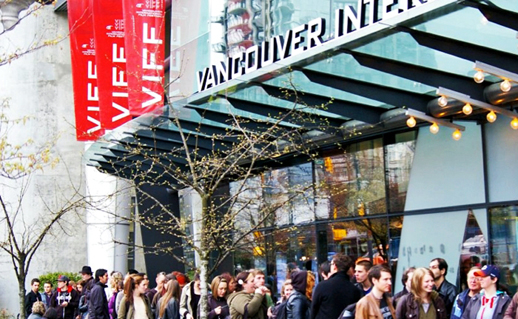
Change is a good thing — especially when it is built upon a foundation of past success and positioned to take an organization to the next level. Marking its 33rd year, the Vancouver International Film Festival Society has gone through a leadership transition, naming Jacqueline Dupuis as Executive Director.
With over 10 years of leadership experience with various international film festivals, Dupuis brings a strong focus on strategic business planning, policy development and fundraising to the VIFF Society. Prior to joining VIFF, Dupuis served as the Executive of Director of the Calgary International Film Festival (CIFF) and was a former member of the CIFF Board of Directors where she headed up CIFF’s (first-ever) strategic planning initiative. Dupuis’s leadership during this initiative resulted in the financial turnaround of the organization, building CIFF’s destination value by differentiating the Festival from others around the world.
“We are so proud of the cultural impact that VIFF has created over the past three decades,” says VIFF Society Board Chairman David Hewitt. “As we enter our 33rd year, we are looking to grow and take the organization to the next level. Our goal is to make the Society not only a cultural icon of cinematic intrigue but also a leader in industry and the business behind entertainment. Jacqueline is the perfect person to do this. Her private sector background, along with international film festival experience, makes her the ideal candidate to transition the VIFF society to realize its potential.”
“I’m honoured to be taking the reins as Executive Director of an organization that is so well respected both in Canada and the cinematic community around the world,” says VIFF Society’s Executive Director, Jacqueline Dupuis. “I will be working with its three year-round business units; the Vancouver International Film Festival, VIFF Industry and the Vancouver International Film Centre.”
In 2013, prior to the official leadership transition, Dupuis launched the VIFF BC Spotlight programme, which featured 12 BC-made feature films, a dedicated marketing campaign and slate of awards, resulting in the highest attended series in the history of the festival. The Georgia Straight lauded the programme “best cheerleading for BC filmmakers”.
As part of VIFF Society’s go-forward direction with the official leadership transition, Dupuis is focusing immediate efforts on facilitating the business of entertainment in BC and Canada. In 2014 the VIFF Film & Television Forum, a four-day business conference that takes place during the festival, is rebranding to VIFF Industry.
Some elements of the expanded focus: in 2014, VIFF Industry will have:
- An increase of 20% in industry guests and speakers attending from LA to leverge Vancouver’s unique proximity to Hollywood
- A greater focus on the local BC service industry, as it is a large driver of our economy and ends with
- An expansion from film and television to broad-based screen entertainment recognizing the strategic importance and growing contributor visual effects, animation and gaming, provides to BC’s screen-based economy (it is the 3rd largest production centre of this kind in the world).
Dupuis replaces Alan Franey who has served as CEO and Festival Director for the past 26 years. Franey, who has played an instrumental role in making VIFF Society the iconic cultural organization it is today, will remain involved with the Festival as Director of Programming.
About VIFF Society

The Greater Vancouver International Film Festival (VIFF) Society is an established not-for-profit cultural society that produces year-round programming at the Vancouver International Film Centre in addition to the 16-day International Film Festival, and four-day VIFF Industry Conference.
The VIFF Society is a charitable not-for-profit arts and cultural organization, employing over 100 staff and 750 volunteers in British Columbia, with an annual operating budget of approximately $5.0 million. Its mandate is to encourage the understanding of other nations through the art of cinema, facilitate the meeting of entertainment professionals from around the world and to stimulate the motion picture industry in BC and Canada.
In its 33rd year, VIFF welcomes the world to Vancouver from September 25 - October 10, 2014. VIFF gratefully acknowledges the generous support of our major partners: Rogers Communications, Fidelity Investments Canada, and Telefilm Canada. VIFF also extends its thanks and appreciation to the Province of British Columbia through the Ministry of Community, Sport, and Cultural Development’s Community Gaming Grants program, as well as the Government of Canada through the Department of Canadian Heritage’s Building Communities through Arts & Heritage.
About Jacqueline Dupuis
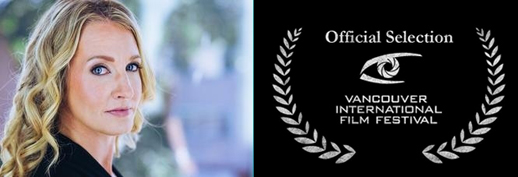
Prior to joining VIFF, Jacqueline served as the Executive of Director of the Calgary International Film Festival (CIFF) for 3 years and former member of the CIFF Board of Directors for three years. Jacqueline took the reins of CIFF after enjoying a very successful 10-year career in business development and management in the high tech sector working for companies such as Xerox and Sun Microsystems where she won numerous awards and accolades.
Throughout her career, Jacqueline’s passion for volunteerism and community support led her to organizations such as the United Way, The Mustard Seed, Theatre Calgary, Betty’s Run for the Cure and the Children’s Cottage, & most recently the Vancouver Downtown Business Improvement Association. Jacqueline is also a proud recipient of the Downtown Vitality Award from Downtown Calgary (Business Revitalization Zone) and recent participant of Executive Lab leadership program at Vantage Point.
An experienced arts administrator with a strong focus on strategic and business planning, policy development and fundraising, Jacqueline’s goal is to leverage her private-sector background and world-class training in business development and management, to enhance quality of life and advance opportunities for creative expression through the proliferation of screen-based media.

